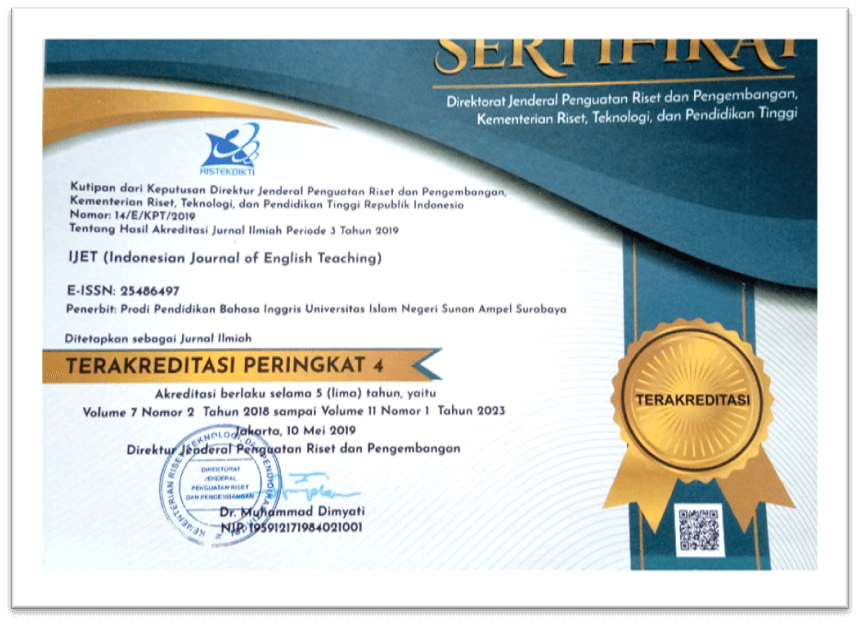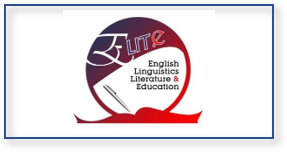English Pre-Service Teachers’ Voice: Game Based Learning to Increase Students’ Learning Engagement
Abstract
In integrating technology in language learning can be done through various way, one of them through game based learning. The game which used in the language learning, especially English class can be used to increase students’ learning engagement. Since English is a foreign language in Indonesia, students need learning engagement in order to understand the material easily. However, in implementing game based learning, teacher need to consider the appropriate game based learning tool, especially pre-service teacher in their first teaching practice. The research used descriptive qualitative to describe how English pre-service teachers implement game based learning to increase students’ learning engagement and how students’ learning engagement is increased through game based learning through questionnaire. The subject was English pre-service teacher in one of state university in Surabaya. The result showed English pre-service teachers implemented game based learning at the first meeting, as main activity, and as assessment in order to increase students’ learning engagement. Furthermore, students’ learning engagement increased through the way they used the game.
Keywords: English Pre-Service Teacher, Game Based Learning, Students’ Learning Engagement
Downloads
References
A. Umamah and A. Saukah, “Digital Game-Based Learning (DGBL): The Voice of EFL University Students and Teachers,” Pasaa, vol. 63, no. June, pp. 279–314, 2022.
C. Asmara, U. M. Magelang, R. N. Muhammad, and U. M. Gresik, “THE USE OF QUIZIZZ APPLICATION FOR MEASURING EFL STUDENTS ’ THE USE OF QUIZIZZ APPLICATION FOR MEASURING EFL STUDENTS ’ ENGAGEMENT AT SD MUHAMMADIYAH,” no. September, 2022.
C. Cárdenas-moncada, “Game- B ased Student Response Systems : The Impact of Kahoot in a Chilean Vocational Higher Education EFL Classroom,” vol. 21, no. 1, pp. 64–78, 2016.
D. S. Lastari, S. M. Mustafa, and Y. N. Aini, “USING GAME-BASED LEARNING TOOL TO ENGAGE YOUNG LEARNERS IN THE EFL ONLINE CLASSROOMS,” pp. 26–33, 2020.
H.-H. Chiang, “Kahoot! In an EFL Reading Class,” J. Lang. Teach. Res., vol. 11, no. 1, p. 33, 2020, doi: 10.17507/jltr.1101.05.
M. E. Eltahir, N. R. Alsalhi, S. Al-Qatawneh, H. A. AlQudah, and M. Jaradat, “The impact of game-based learning (GBL) on students’ motivation, engagement and academic performance on an Arabic language grammar course in higher education,” Educ. Inf. Technol., vol. 26, no. 3, pp. 3251–3278, 2021, doi: 10.1007/s10639-020-10396-w.
R. Dashtestani, “The Winding Path towards Implementing Digital Game-based Learning ( DGBL ) in an Educational Context : the Voices of Pre-service Teachers,” vol. 23, pp. 70–93, 2022.
R. Li, Z. Meng, M. Tian, Z. Zhang, and W. Xiao, “Modelling Chinese EFL learners ’ flow experiences in digital game-based vocabulary learning : the roles of learner and contextual factors Modelling Chinese EFL learners ’ flow experiences in digital game-based vocabulary learning : the roles of,” Comput. Assist. Lang. Learn., vol. 0, no. 0, pp. 1–22, 2019, doi: 10.1080/09588221.2019.1619585.
S. Ebadi, R. Rasouli, and M. Mohamadi, “Exploring EFL learners ’ perspectives on using Kahoot as a game-based student response system Exploring EFL learners ’ perspectives on using Kahoot as a game-based student response system,” Interact. Learn. Environ., vol. 0, no. 0, pp. 1–13, 2021, doi: 10.1080/10494820.2021.1881798.
S. Zuhriyah and B. W. Pratolo, “Exploring Students ’ Views in the Use of Quizizz as an Assessment Tool in English as a Foreign Language ( EFL ) Class,” vol. 8, no. 11, pp. 5312–5317, 2020, doi: 10.13189/ujer.2020.081132.
Y. Benhadj, M. El Messaoudi, A. Nfissi, H. S. Fes, and E. Id, “Investigating the Impact of Kahoot ! on Student s ’ Engagement , Motivation , and Learning Outcomes : Ifrane Directorate as a case study,” vol. 2, no. 6, pp. 1–9, 2019, doi: 10.5281/zenodo.3250661.
Y. Chen, “The effect of using a game-based translation learning app on enhancing college EFL learners’ motivation and learning experience,” Educ. Inf. Technol., no. 0123456789, 2022, doi: 10.1007/s10639-022-11174-6.










